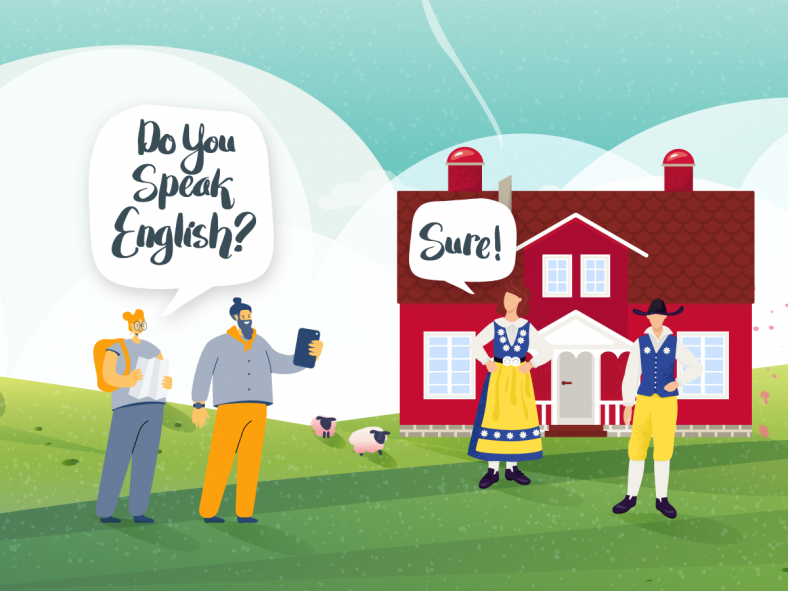You might consider a trip—or even a relocation—to one of the Scandinavian countries, and you might wonder about any potential language barriers. Will English be enough in Scandinavia? Do Nordic people in general understand and speak English well?
- So is English Enough to Get By in Scandinavia?
- English Proficiency in the Nordic Countries
- So Can I Work in Scandinavia if I Only Speak English?
- 🇸🇪 Can I Get By in Sweden if I only speak English?
- 🇩🇰 Can I Get By in Denmark if I only speak English?
- 🇳🇴 Can I Get By in Norway if I only speak English?
- 🇫🇮 Can I live in Finland if I only speak English?
As a native Swede with an American better half and three Swedish-American offspring, we tend to hang out with lots of English-speaking expats who all live around Malmö (Sweden) and Copenhagen (Denmark). And these questions come up a lot during our conversations, as most of our friends decided to move to Scandinavia without knowing the native language of their new home.
So is English Enough to Get By in Scandinavia?
Nordic people generally speak English well, as they consume lots of English media, travel a lot, are highly educated, are taught English in school, and share Germanic language roots. There are plenty of jobs and programs available that only require English proficiency, but most require knowing the native language.
So you can likely get by just fine with English only in daily Scandinavian life, but in order to fully integrate into Nordic society and culture, you will have to learn the native language at some point.
That’s my take and personal recommendation after having researched this in detail, and taken my own and my friends’ personal experiences into account. If you want to see more of this research and how well English is understood in individual Nordic countries, read on as I go into more detail below.
English Proficiency in the Nordic Countries
While there are plenty of exceptions in the more remote places of the Nordic region, most Nordic people can speak and understand English quite well. This is both my own experience and something we can see support for in scientific surveys and research papers these days.
One such example is a major study conducted by the Nordic Council in 2021, in which we gain an intriguing insight into how young people in the Nordics understand and use English in their daily life. Let’s start with the understanding part:
2000 young Nordics were asked about their language comprehension. Source: Nordic Council 2021
So in plain words: Nordic people generally understand English better than their neighboring Scandinavian languages.
My own experiences line up with this, as all the Nordic people I have come across almost exclusively prefer to converse English rather than one of the Scandinavian languages. Though many Nordics can understand and converse in multiple Scandinavian languages, English is commonly the preferred language to communicate within the Nordic region.
If you’re interested in finding out more about how Scandinavian people communicate with each other, I’ve written an article where I do a deep-dive into which languages each nationality in the Nordic countries understands and use when speaking to fellow Nordics.
As English and the Scandinavian languages are Germanic languages stemming from the same Nordic Bronze Age culture, they also share many words and even some grammar.
A shared history and ancestry (the Angles, Saxons, Vikings, and Normans all originated from Scandinavia) means many shared language elements that go back, hidden as they might be to our modern ears.
Especially young Scandinavians seem to know English extremely well, with more than 92% of young Danes, Swedes, Norwegians, Icelanders, Finns, Faroese, Greenlanders, and Ålanders understanding and being able to speak and write in English.
| Country | Can understand English | Can Speak & Write in English |
|---|---|---|
| 🇩🇰 Denmark | 96% | 94% |
| 🇫🇮 Finland | 93% | 92% |
| 🇮🇸 Iceland | 95% | 98% |
| 🇳🇴 Norway | 95% | 93% |
| 🇸🇪 Sweden | 95% | 94% |
| 🇫🇴 Faroe Islands | 93% | 96% |
| 🇬🇱 Greenland | 78% | 78% |
| 🇦🇽 Åland | 99% | 97% |
| Nordic Region | 95% | 93% |
Source: Nordic Council 2021
And if we look at the population as a whole, four out of the top five nationalities in EF’s 2020 English Proficiency Index are Nordic (Denmark, Finland, Sweden, Norway), all of them having a “very high” English proficiency.
The EPI is based on TOEFL test results taken by a mix of young adults and adult language learners from a broad range of ages.
Here is a list of the twelve countries that had a “very high” English proficiency and the EF EPI score:
| Rank & Country | English proficiency level | EF EPI score |
|---|---|---|
| 01. 🇳🇱 Netherlands | Very High | 652 |
| 02. 🇩🇰 Denmark | Very High | 632 |
| 03. 🇫🇮 Finland | Very High | 631 |
| 04. 🇸🇪 Sweden | Very High | 625 |
| 05. 🇳🇴 Norway | Very High | 624 |
| 06. 🇦🇹 Austria | Very High | 623 |
| 07. 🇵🇹 Portugal | Very High | 618 |
| 08. 🇩🇪 Germany | Very High | 616 |
| 09. 🇧🇪 Belgium | Very High | 612 |
| 10. 🇸🇬 Singapore | Very High | 611 |
| 11. 🇱🇺 Luxembourg | Very High | 610 |
| 12. 🇿🇦 South Africa | Very High | 607 |
Source: EF 2020 English Proficiency Index. Very High Proficiency corresponds to CEFR levels C1 and C2.
It’s also worth noting that the Dutch and German languages are responsible for an additional five countries on this list, and they share the same Germanic language origin as the Scandinavian languages (not including Finnish, a Finno-Ugric language).
So Can I Work in Scandinavia if I Only Speak English?
It is possible to work, live, and study in Scandinavia knowing only English, as the entire Nordic region speaks and understands English very well, and there are plenty of job listings and university programs where English is the preferred language (especially in Sweden and Denmark).
Here is a list of all the available jobs the international job listings site Indeed has listed as of October 2021 in Sweden, Denmark, Norway and Finland respectively, and how many of them are English-speaking jobs:
Native & English Language Job Listings in Nordic Countries
Source: Indeed October 2021
| Country | English language jobs | Native language jobs |
|---|---|---|
| Sweden | 12201 | 50097 |
| Denmark | 8018 | 32545 |
| Norway | 2472 | 14247 |
| Finland | 5020 | 83469 |
As we can see the vast amount of jobs will require proficiency in the respective native language, but if you have found an English-speaking job, if you’re only staying for a little while, or if you’re just nervous that you won’t be understood on your trip to Scandinavia, you can rest easy and know you’ll be understood just fine.
So, the entire Nordic region speaks and understands English better than most other countries where English isn’t the first language (even those sharing Germanic language links), and there seems to be plenty of job listings, especially in Scandinavia, where English is the preferred language.
Let’s take a look at the biggest Nordic countries individually.

🇸🇪 Can I Get By in Sweden if I only speak English?
You can visit, study, work, and live in Sweden and get by with English only, as long as your job or studies do not require Swedish proficiency. Swedes have a very high English proficiency, learn English from a young age in school, and usually love a chance to practice their English with a native English speaker.
In fact, many English speakers I know are struggling to learn Swedish because they rarely need to speak it to get by in everyday life, because Swedes are generally quick to switch to English as soon as they hear that someone is from countries such as the US, Canada, or the UK.
That said, I think anyone planning to relocate to a new country and a new culture should try to go all-in and take in as much as possible on all fronts. Learning Swedish will not only help you immensely in getting a job in Sweden, it will also improve your executive brain functions and improve your cognitive abilities.
I also want to specifically note that a lot of jobs in Sweden will require understanding and being able to speak Swedish, and in the last decade I’ve seen many examples of people having the competency but lacking the required Swedish language skill to get a job they’re eyeing.
Stockholm residents are furthermore among the least proficient in English out of the Nordic capitals, which is still really good generally speaking. Still, it shows that you’ll be better off learning Swedish if you plan to stay in the city for a longer period of time.
In the end, there will be plenty of jobs in Stockholm, Gothenburg, and Malmö where English is the primary work language, or where English will do just fine in 95% of interactions. You will encounter few instances in everyday Nordic life when English won’t be enough to make yourself understood.
English-speaking jobs make up 19.6% of all jobs on Indeed, and 34.7% of all job listings on Jooble, giving you a good idea of how many jobs there are where English will be enough (and is even a prerequisite). It should be noted that some of these jobs are remote jobs, but they are all based out of Sweden at least.
Either way, Swedish employers have also been instructed to ease their Swedish language requirements from 2021 and onwards by the Swedish Employment Agency, opening up even more opportunities to work and live in Sweden for English natives.

🇩🇰 Can I Get By in Denmark if I only speak English?
English will be more than enough to make yourself understood and live, work or study in Denmark, provided your job doesn’t require knowing Danish. Danes rank first in English proficiency within the Nordic region and Copenhagen residents score the highest in English proficiency among the Nordic capital cities.
There will be jobs and situations in Danish life that will require Danish proficiency, but if you can find a job that is okay with primarily English, you’ll most likely not encounter any obstacles sticking with English in everyday encounters as well.
And as we can see there are plenty of English-speaking jobs in Denmark:
If you’re planning to stay in Denmark for a considerable time you will definitely want to immerse yourself in the Danish culture and language, but if you’re only staying for a short period you’ll get by fine with English only.

🇳🇴 Can I Get By in Norway if I only speak English?
You’ll most likely be able to live, work or study in Norway and get by with English only, as long as your job doesn’t require Norwegian proficiency. 95% of Norwegians can understand English, and they rank fourth in the world in English proficiency.
There are also plenty of jobs in a variety of sectors where English proficiency will be enough, especially in food processing, hospitality, and in the gas & oil industry. It will also be hard to stand out with your English skills, as all Norwegian school kids start learning English from 1st grade.
Although interestingly Oslo residents seem to be lagging a bit behind coming in second to last in English proficiency out of the Nordic capitals, while I haven’t personally felt that English wasn’t enough on my numerous Oslo visits.

🇫🇮 Can I live in Finland if I only speak English?
People can get by just fine with English only among Finns, who rank second in English proficiency within the Nordic region and usually communicate in English with their Nordic neighbors. Helsinki also scores second-highest in English proficiency among the Nordic capital cities, and has many English-only jobs.
I have personally gotten by in Finland with mostly English when I’ve been visiting and talking to my huge family who live there (my mother was born in Finland and moved to Sweden when she was 10 or so).
We went to Finland every year when I was growing up, but as my mom never spoke Finnish with us kids we had little chance picking up more than a handful of words and phrases during our annual week-long visits. So my sister, cousins, and I have made ourselves with a mix of English, Swedish, and very little Finnish.
It doesn’t make it any easier when you consider how different Finnish and Swedish is, and of course that a lot of Finns know enough Swedish and especially English to get by just fine with those two only.
Finland doesn’t have as many English-speaking job listings as Sweden and Denmark, but still have a decent amount, and one of the sites show a quite large percentage of English jobs compared to Finnish jobs:
That said, you will likely need to learn Finnish for a long-term stay in Finland, as there are places where it is expected to at least know the basics, and most jobs will require Finnish proficiency in the end.
Final words:
I strongly believe and recommend that everyone should immerse themselves in whatever culture they chose or find themselves to live in, and that almost always includes learning the native language. But for Scandinavia specifically, at least you’ll be able to get by with English only while you learn the native language.
Sources:
https://pub.norden.org/nord2021-004/
https://www.ef.se/blog/language/sverige-inte-langre-nast-bast-i-varlden-pa-engelska-ef-epi/
https://uu.diva-portal.org/smash/get/diva2:1337476/FULLTEXT01.pdf
https://se.babbel.com/popularaste-sprak-europa
 English in Sweden: How Well Swedes Speak & Understand English
English in Sweden: How Well Swedes Speak & Understand English Should I Learn Swedish or Norwegian? (Answered with Data & Graphs)
Should I Learn Swedish or Norwegian? (Answered with Data & Graphs) Nordic and Scandinavian Languages Explained and Ranked
Nordic and Scandinavian Languages Explained and Ranked How Nordic People Understand & Talk To Each Other (+ Graphs)
How Nordic People Understand & Talk To Each Other (+ Graphs)


I`v been watching the HBO series House of the Dragons which deals with the Tagarain family from Game ofThrones which delt with Denaris Targan`s roots in House of the Dragons. . I notice that there are also xcandinadian norwigin roots in Hous of the Dragons too and some oth the cast members are also from Game of Throns.. Voulf House of the Dragons be a sin-off from game of thrones, and if he is asecond season of House of he Dragon will we see more of the Tagarin family inludin Denaris Tagarin too etc,etc? thankyou